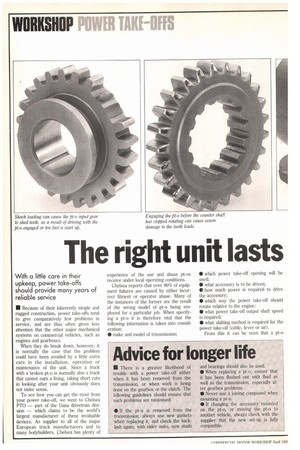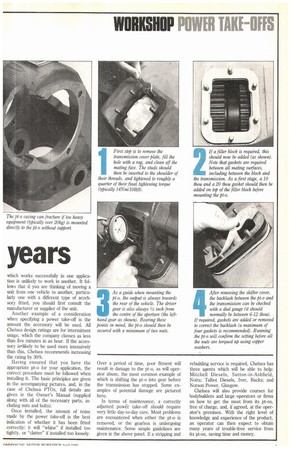The right unit lasts
Page 108

Page 109

If you've noticed an error in this article please click here to report it so we can fix it.
years
With a little care in their upkeep, power take-offs should provide many years of reliable service
IN Because of their inherently simple and rugged construction, power take-offs tend to give comparatively few problems in service, and are thus often given less attention that the other major mechanical systems on commercial vehicles, such as engines and gearboxes.
When they do break down, however, it is normally the case that the problem could have been avoided by a little extra care in the installation, operation or maintenance of the unit. Since a truck with a broken pt-o is normally also a truck that cannot earn a living, taking short cuts in looking after your unit obviously does not make sense.
To see how you can get the most from your power take-off, we went to Chelsea PTO — part of the Dana drivetrain division — which claims to be the world's largest manufacturer of these invaluable devices. As supplier to all of the major European truck manufacturers and to many bodybuilders, Chelsea has plenty of experience of the use and abuse pt-os receive under local operating conditions.
Chelsea reports that over 90% of equipment failures are caused by either incorrect fitment or operator abuse. Many of the instances of the former are the result of the wrong model of pt-o being employed for a particular job. When specifying a pt-o it is therefore vital that the following information is taken into consideration: • make and model of transmission; • which power take-off opening will be used; • what accessory is to be driven; • how much power is required to drive the accessory;
• which way the power take-off should rotate relative to the engine;
• what power take-off output shaft speed is required; • what shifting method is required for the power take-off (cable, lever or air). From this it can be seen that a pt-o
which works successfully in one application is unlikely to work in another. It follows that if, you are thinking of moving a unit from one vehicle to another, particularly one with a different type of accetsory fitted, you should first consult the manufacturer or supplier of the unit.
Another example of a consideration when specifying a power take-off is the amount the accessory will be used. All Chelsea design ratings are for intermittent usage, which the company classes as less than five minutes in an hour. If the accessory is likely to be used more intensively than this, Chelsea recommends increasing the rating by 30%.
Having ensured that you have the appropriate pt-o for your application, the correct procedure must be followed when installing it. The basic principles are given in the accompanying pictures, and, in the case of Chelsea PT0s, full details are given in the Owner's Manual (supplied along with all of the necessary parts, including nuts and bolts).
Once installed, the amount of noise made by the power take-off is the best indication of whether it has been fitted correctly: it will "whine" if installed too tightly, or "clatter" if installed too loosely. Over a period of time, poor fitment will result in damage to the pt-o, as will operator abuse, the most common example of which is shifting the pt-o into gear before the transmission has stopped. Some examples of potential damage are pictured here.
In terms of maintenance, a correctly adjusted power take-off should require very little day-to-day care. Most problems are encountered when either the pt-o is removed, or the gearbox is undergoing maintenance. Some simple guidelines are given in the above panel. If a stripping and rebuilding service is required, Chelsea has three agents which will be able to help: Mitchell Diesels, Sutton-in-Ashfield, Notts; Talbot Diesels, Iver, Bucks; and Norson Power, Glasgow.
Chelsea will also provide courses for bodybuilders and large operators or firms on how to get the most from its pt-os, free of charge, and, if agreed, at the operator's premises. With the right level of knowledge and experience of the product, an operator can then expect to obtain many years of trouble-free service from its pt-os, saving time and money.








































































































































